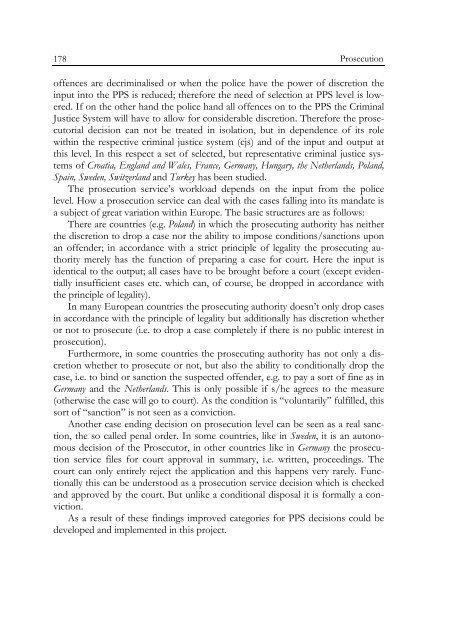Defining and Registering Criminal Offences and Measures - Oapen
Defining and Registering Criminal Offences and Measures - Oapen
Defining and Registering Criminal Offences and Measures - Oapen
Create successful ePaper yourself
Turn your PDF publications into a flip-book with our unique Google optimized e-Paper software.
178<br />
Prosecution<br />
offences are decriminalised or when the police have the power of discretion the<br />
input into the PPS is reduced; therefore the need of selection at PPS level is lowered.<br />
If on the other h<strong>and</strong> the police h<strong>and</strong> all offences on to the PPS the <strong>Criminal</strong><br />
Justice System will have to allow for considerable discretion. Therefore the prosecutorial<br />
decision can not be treated in isolation, but in dependence of its role<br />
within the respective criminal justice system (cjs) <strong>and</strong> of the input <strong>and</strong> output at<br />
this level. In this respect a set of selected, but representative criminal justice systems<br />
of Croatia, Engl<strong>and</strong> <strong>and</strong> Wales, France, Germany, Hungary, the Netherl<strong>and</strong>s, Pol<strong>and</strong>,<br />
Spain, Sweden, Switzerl<strong>and</strong> <strong>and</strong> Turkey has been studied.<br />
The prosecution service’s workload depends on the input from the police<br />
level. How a prosecution service can deal with the cases falling into its m<strong>and</strong>ate is<br />
a subject of great variation within Europe. The basic structures are as follows:<br />
There are countries (e.g. Pol<strong>and</strong>) in which the prosecuting authority has neither<br />
the discretion to drop a case nor the ability to impose conditions/sanctions upon<br />
an offender; in accordance with a strict principle of legality the prosecuting authority<br />
merely has the function of preparing a case for court. Here the input is<br />
identical to the output; all cases have to be brought before a court (except evidentially<br />
insufficient cases etc. which can, of course, be dropped in accordance with<br />
the principle of legality).<br />
In many European countries the prosecuting authority doesn’t only drop cases<br />
in accordance with the principle of legality but additionally has discretion whether<br />
or not to prosecute (i.e. to drop a case completely if there is no public interest in<br />
prosecution).<br />
Furthermore, in some countries the prosecuting authority has not only a discretion<br />
whether to prosecute or not, but also the ability to conditionally drop the<br />
case, i.e. to bind or sanction the suspected offender, e.g. to pay a sort of fine as in<br />
Germany <strong>and</strong> the Netherl<strong>and</strong>s. This is only possible if s/he agrees to the measure<br />
(otherwise the case will go to court). As the condition is “voluntarily” fulfilled, this<br />
sort of “sanction” is not seen as a conviction.<br />
Another case ending decision on prosecution level can be seen as a real sanction,<br />
the so called penal order. In some countries, like in Sweden, it is an autonomous<br />
decision of the Prosecutor, in other countries like in Germany the prosecution<br />
service files for court approval in summary, i.e. written, proceedings. The<br />
court can only entirely reject the application <strong>and</strong> this happens very rarely. Functionally<br />
this can be understood as a prosecution service decision which is checked<br />
<strong>and</strong> approved by the court. But unlike a conditional disposal it is formally a conviction.<br />
As a result of these findings improved categories for PPS decisions could be<br />
developed <strong>and</strong> implemented in this project.

















